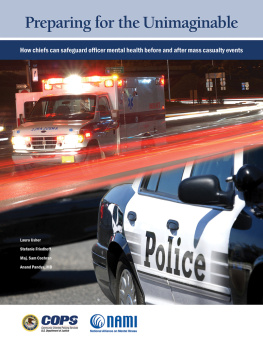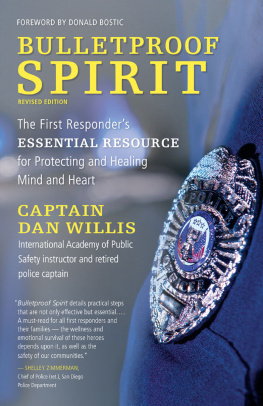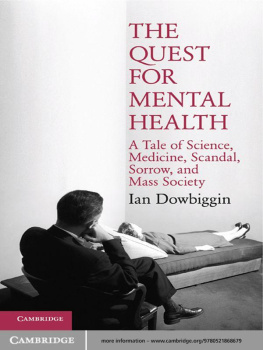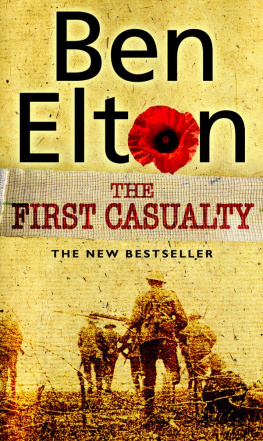

First published in 2013 by the Office of Community Oriented Policing Services.
First Skyhorse Edition 2018.
Skyhorse Publishing books may be purchased in bulk at special discounts for sales promotion, corporate gifts, fund-raising, or educational purposes. Special editions can also be created to specifications. For details, contact the Special Sales Department, Skyhorse Publishing, 307 West 36th Street, 11th Floor, New York, NY 10018 or .
Skyhorse and Skyhorse Publishing are registered trademarks of Skyhorse Publishing, Inc., a Delaware corporation.
Visit our website at www.skyhorsepublishing.com.
10 9 8 7 6 5 4 3 2 1
Library of Congress Cataloging-in-Publication Data is available on file.
Cover design by Office of Community Oriented Policing Services
Cover photo credit: Office of Community Oriented Policing Services
ISBN: 978-1-5107-2613-0
Ebook ISBN: 978-1-5107-2625-3
Printed in China

As law enforcement executives it is our duty to keep our officers safe and healthy. Thank you to those that contributed to this important resource that helps us tackle the topics of resiliency as well as the effects of a mass casualty incident on officers mental health both during and in the time that follows.
Terrence Cunningham, Chief of Police, Wellesley (Massachusetts) Police Department and President of the International Association of Chiefs of Police
The mental health of our officers should be of the utmost importance. Whether issues are brought about by life circumstances, tragedy, critical incidents, or on-the-job stress, it is incumbent upon us as leaders to acknowledge the realness of the situation and to provide opportunities for help. As agency heads, we have the opportunity to provide permission to our agencies to speak openly and candidly about the mental health of our members.
Colonel Matt Langer, Chief of Police, Minnesota State Patrol
This project was supported by cooperative agreement 2013-CK-WX-K038 awarded by the Office of Community Oriented Policing Services, U.S. Department of Justice. The opinions contained herein are those of the author(s) and do not necessarily represent the official position or policies of the U.S. Department of Justice. References to specific agencies, companies, products, or services should not be considered an endorsement by the author(s) or the U.S. Department of Justice. Rather, the references are illustrations to supplement discussion of the issues. The Internet references cited in this publication were valid as of the date of publication. Given that URLs and websites are in constant flux, neither the author(s) nor the COPS Office can vouch for their current validity.
Recommended citation:
Usher, Laura, Stefanie Friedhoff, Sam Cochran, and Anand Pandya. 2016. Preparing for the Unimaginable: How Chiefs Can Safeguard Officer Mental Health Before and After Mass Casualty Events. Washington, DC: Office of Community Oriented Policing Services.
Contents
Letter from the Director
Dear colleagues,
Its hard to imagine that an incident as horrific as those that occurred in Newtown, Charleston, and San Bernardino could occur in our own communities. Indeed, events of this kind are rare. But they do happen, and law enforcement leaders must be prepared not only for a possible incident but also for the aftermath that would follow.
Though most agencies have trained and equipped their officers for immediate response to mass casualties, few have prepared their personnel for the psychological fallout. Tragic events can have a profound effect on first responders, who may suffer emotional distress that lingers long afterward, leading to personal problems, alcoholism, post-traumatic stress disorder, and even suicide.
To help the Newtown (Connecticut) Police Department cope with the murder of 26 people, including 20 children, at Sandy Hook Elementary School, the COPS Office reached out to the National Alliance on Mental Illness (NAMI) to provide guidance. Preparing for the Unimaginable is the result of NAMIs work with Newtowns police chief, Michael Kehoe.
This unique publication offers expert advice and practical tips for helping officers to heal emotionally, managing public reaction, dealing with the media, building relationships with other first responder agencies, and much more. But what makes this handbook especially helpful are the case studies and stories from the field contributed by chiefs, officers, and mental health professionals who have lived through traumatic incidents.
We especially want to thank Chief Kehoe for his commitment to this effort, which required reliving a traumatic event. He and the other law enforcement professionals who contributed their personal experiences deserve our thanks for being open about this issue and sharing their lessons learned.
It is our hope that this handbook will be read by police chiefs and sheriffs throughout the country. Though Preparing for the Unimaginable focuses on mass casualty incidents, traumatic events arise in everyday police work as well, and their effect cannot be overstated.
The COPS Office is dedicated to promoting all aspects of officer wellness and safety, and as the Final Report of the Presidents Task Force on 21st Century Policing noted, the wellness and safety of law enforcement officers is critical not only to themselves, their colleagues, and their agencies but also to public safety. We applaud NAMI for bringing the critical issue of officer mental health to the forefront with this eye-opening publication.
Sincerely,

Ronald L. Davis
Director
Office of Community Oriented Policing Services
Foreword: Leadership When the Unimaginable Occurs
The Sandy Hook Elementary School shooting on December 14, 2012 caused a collective pause in the United States because of the brutality of the actions against the most vulnerable members of society. As the events unfolded and the world became aware of the devastation that occurred in an elementary school, police officers throughout the state of Connecticut were already busy handling a multitude of important responsibilities required when a tragedy befalls a community.
The ability of media to quickly share the news of tragic events adds to the stress and trauma normally associated with highly critical events. Law enforcement must initially respond to these events to mitigate the dangers inherent in the crisis. Then they must successfully navigate the aftermath, including daily intrusions and reminders of the tragedy from the media and offers of assistance from hundreds of well-intentioned community members and visitors arriving with stuffed animals, flowers, food, and other gifts.
In addition to responding to traumatic events, dealing with the scope and duration of the aftermath of tragedies is one of the most important concerns of police chiefs and sheriffs throughout the country.
Ensuring the mental wellness and health of first responders has long been an underappreciated task for the heads of police agencies. U.S. law enforcement has learned from tragic events over the years and now trains to respond to threats with the best equipment and practices known today. However, many chiefs are not prepared to deal effectively with the intense scope and unanticipated duration of the aftermath of these events, and many chiefs are unaware of the impact such events will have on their communities and the officers in their agencies.
Next page













